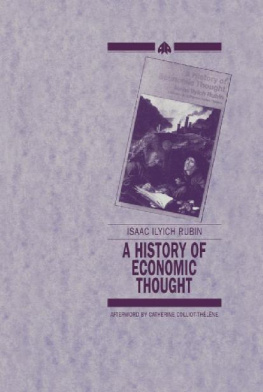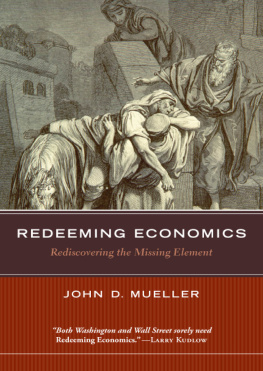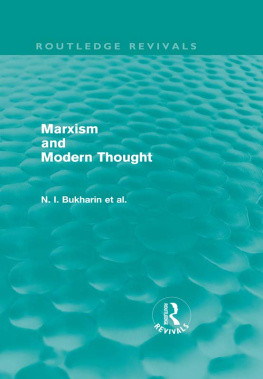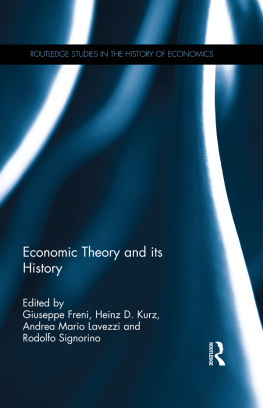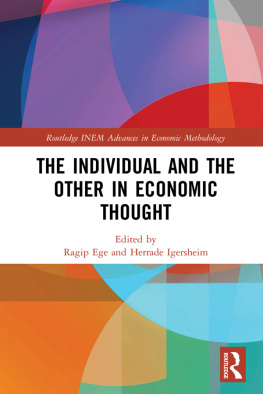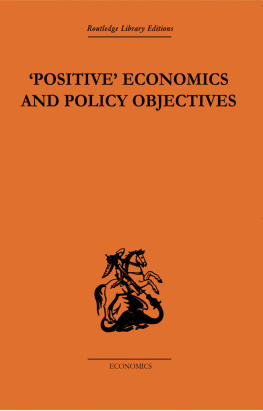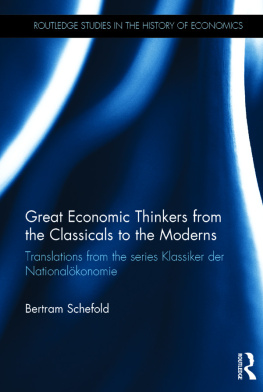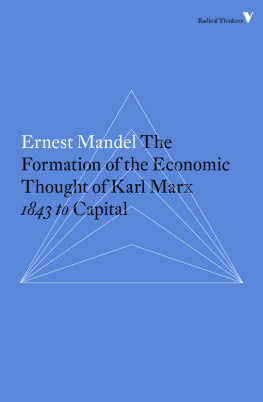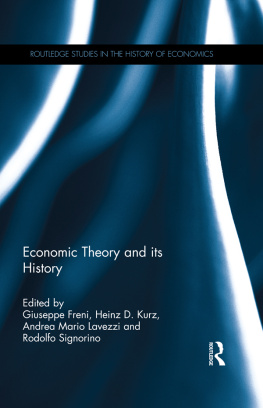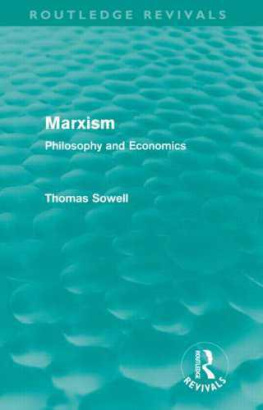..





 1 9 2 9
1 9 2 9 
A History of
Economic Thought
by
Isaac Ilych Rubin
Translated and edited by Donald Filtzer
Afterword
by
Catherine Colliot-Thlne

First published as Istoriya ekonomicheskoi
mysli (Gosizdat RSFSR). This translation
taken, with the permission of the New York
Public Library, from a copy of the second
printing of the second, revised Russian edition
(1929) in that librarys possession.
This edition first published in 1979
Second impression 1989
Translation by Don Filtzer
Pluto Press 1989
345 Archway Road
London N6 5AA
Afterword by Catherine Colliot-Thlne
World rights in all languages
Pluto Press 1989
The Frontispiece is taken from the
New York Public Library photocopy of the
1929 Russian edition of Rubins book.
ISBN 9780745303017
ISBN 0745303013
ISBN 9781783716340 ePub
ISBN 9781783716357 Mobi
Printed and bound by Antony Rowe Ltd, Eastbourne
CONTENTS
Part One
Mercantilism and its Decline |
Part Two
The Physiocrats |
Part Three
Adam Smith |
Part Four
David Ricardo |
Part Five
The Decline of the Classical School |
Part Six
Conclusion: A Brief Review of the Course |
Afterword
By Catherine Colliot-Thlne |
Editors Preface
This English edition of Isaac Rubins A History of Economic Thought has been prepared from the New York Public Librarys copy of the 1929 reprinting of the second, revised Russian edition. As the reader will learn from Rubins Preface, the book is made up of a series of lectures and was used as a university text. The book must have been in fairly general use, because the reprint of the second edition ran to 5,000 copies. The lectures were intended to be used alongside two other texts, Marxs Theories of Surplus Value and an anthology compiled by Rubin of extracts from pre-Classical and Classical political economy, Classics of Political Economy From the Seventeenth to the Mid-Nineteenth Century [Klassiki politicheskoi ekonomii ot XVII do srediny XIX veka] (Gosizdat RSFSR, 1926).
The design of Rubins book has presented certain difficulties in translating and editing an English edition. Because it was to be used together with the above-mentioned collection, A History of Economic Thought contains no references for any of its quotations. Thus we have had to go through the laborious task of tracking down the standard English editions of the works of the many philosphers and economists from whom Rubin quotes. In most cases this was relatively straightforward; in others, such as the Physiocrats or Sismondi, whose works are translated either only partially into English or not at all, we have on occasion had to be satisfied with re-translating Rubins own Russian rendering of the passages in question. The reader will see from the Editors notes that these represent only a very small minority of the quotations, and that most passages are from the English original (in the case of French authors, most quotes are either from the standard English translation or have been translated directly from the French).
In editing the work we have provided copious notes directing the reader to the original sources; very often we have also given quotations fuller than those provided by Rubin, so as to allow the reader to gain a better sense of the arguments of Petty, Smith, Ricardo, etc. We have also used the notes to guide the reader to other secondary sources that she or he might find useful and to explain historical and conceptual references that might be unclear in the main text.
As for the terminology used, we have in general followed this rule: where Rubin is paraphrasing a particular author we have tried to retain that authors own usage, whereas when translating Rubins discussions of these texts we have opted for the terminology accepted in modern usage. There are certain exceptions, e.g., in the section on Adam Smith where we have replaced Smiths term commandable labour with the more modern purchasable labour. We have also followed the standard practice of not modernizing the spelling or syntax of the passages quoted.
In a small number of cases we have deleted certain sentences or phrases in which Rubin is recapitulating a doctrine that he has already discussed on several occasions. These repetitive summaries, e.g., of the Physiocrats views on productive labour or Smiths theory of profit, whilst perhaps of value in maintaining the continuity of Rubins classroom lectures, are a genuine obstacle to someone trying to read the text straight through. In no case have we cut more than one or two sentences at a time, and the sum of these elisions amounts to no more than two or three printed pages: thus the reader need have no fear about whether she or he is receiving a genuine original edition.
Finally, I should like to acknowledge the assistance of the reference staff of the main library of the University of Glasgow and of the staff of the Sidney Jones Library, University of Liverpool, who gave me invaluable help in locating and using many of the original editions from which I had to take quotations. I should like also to thank Prof. D.P. OBrien of the University of Durham and Prof. Andrew S. Skinner of the University of Glasgow for their help in tracking down certain highly elusive passages. Needless to say, all of these people are blameless for any remaining shortcomings in this volume.
Donald Filtzer
Birmingham, England
April 1979
The study of the history of economic thought holds immense historical and theoretical interest. As a science it is closely tied, on the one hand, to the history of economic development and the struggle between the classes and, on the other, to theoretical political economy.
From an historical point of view, economic doctrines and ideas can be seen to have been amongst the most important and influential forms of ideology. As with other forms of ideology, the evolution of economic ideas depends directly upon the evolution of economic forms and the class struggle. Economic ideas are not born in a vacuum. Often they arise directly out of the stir and strife of social conflicts, upon the battleground between different social classes. In these circumstances, economists have acted as arms-bearers for these classes, forging the ideological weapons needed to defend the interests of particular social groupsoften not concerning themselves any longer with developing their own work and giving it greater theoretical foundation. This was the lot that befell the economists of the mercantilist period (16th and 17th centuries), who devoted countless topical pamphlets to the ardent defence of the interests of merchant capital. Yet even if we look at the Physiocrats and the economists of the Classical school, whose works conform far more to the demands of theoretical clarity and logical coherence, we have little difficulty in identifying the social and class forces behind the different currents of economic thought. Though it occurs less openly and with greater complexity, we still find that the requirements of economic policy exert a powerful impact upon the orientation of economic ideas. In the most abstract constructs of the Physiocrats or Ricardothose that seem farthest removed from real lifewe shall discover a reflection of contemporary economic conditions and an expression of the interests of particular social classes and groups.
Next page
